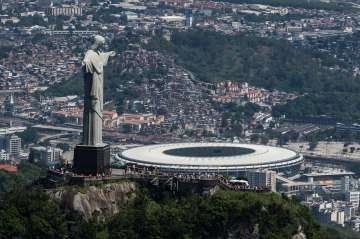Onset of 31st Olympic Games in Rio in thick of doping controversies
Despite Brazil putting its best foot forward to detach the Games from the shadow of the biggest doping scandal afflicting the Russian players, a plethora of incidents related to doping have cast a heavy shadow

Despite Brazil putting its best foot forward to detach the Games from the shadow of the biggest doping scandal afflicting the Russian players, a plethora of incidents related to doping have cast a heavy shadow on the most prestigious event in competitive sports.
Rio is all set to roll out the red carpet for athletes, officials and visitors from over 200 countries for the 31st edition of the Olympic Games.
Expected to have a global audience of several billions, the games saw India’s own struggle to make it to the prestigious event.
While India’s shot putter Inderjeet Singh was banned from going to Rio, its wrestler Narsingh Pancham Yadav won the approval of the national anti-doping regulator by the skin of his teeth, successfully claiming that his food had been spiked by a rival.
Also joining the list is an Irish boxer who was held back for testing positive to a banned substance to which the officials reiterated that no tolerance would be shown to those who took drugs to enhance performance.
In an earlier statement by the committee which oversees the games, it was stated, "The fight against doping is a top priority for the IOC, which has established a zero-tolerance policy."
The International Olympic Committee on Thursday approved 271 Russian athletes to participate out of the original contingent of 389, banning some 30 per cent of the participants blamed on "state-directed" doping and cover-up.
The IOC decision came just about 24 hours before the games extravaganza takes off with an opening ceremony at the Maracana stadium here on Friday evening (early Saturday in India).
The committee rejected calls to ban Russia entirely from the games, following report by World Anti-Doping Agency of wide-spread doping and cover-up by Russian authorities.
The decision may have come as a relief to those who had been preparing for years to participate in the world's most prestigious games.
Alexander Zhukov, president of the Russian Olympic Committee told the media there was "good news" for the fans as "the majority" of the sports had been admitted in full. The entire track and field team of the country had earlier been banned after the scandal hit the headlines.
Worries over readiness of the infrastructure have dogged the game for weeks, but Brazilian officials said they were ready to open the games with full fanfare and every requirement in place.
Many athletes had decided not to compete at Rio, worried about the Zika virus, which can results in serious birth defects.
Zika is carried by mosquitoes, although some vaccines have shown early promises against the virus. But these may still be years away from widespread usage.
The opening day ceremony, in preparation for weeks, is estimated to be watched by over three billion people with Brazilian supermodel Gisele Bundchen and Britain's Judi Dench expected to participate where over 300 professional dances and 5,000 volunteers will be performing.
Officials said it would be the "sexiest" opening ceremonies of all games, though it was not immediately clear what it meant, with most people speculating that there would be more "flesh" shown than has been the norm.
The creative director of the ceremony, however, told the media that there will be far less money spent in Brazil's show than had been done in London in 2012 or Beijing in 2008. He said you could do much more with "heart, without spending".
Executive producer, Marco Balich, had said on Tuesday that the ceremony would send out a message of hope.
Brazil, he added, had the "last garden in the world" in Amazon and this needed to be protected, though the message would not be that the world would end because of global warming.
Worries about safety in Rio surfaced again after a Russian diplomat -- a Brazilian holding the post of vice counsel, foiled a robbery attempt by shooting dead one of the two motorcycle riders, who, local media said, wanted to hijack the car he was in.
Earlier, on Wednesday, three Swedish Olympics tourists were kidnapped near a favela, an urban slum, but were later let go unharmed.
Numerous muggings have been reported, with local media reporting a spurt in crime in Rio, but police deployment is visible and strong everywhere.
Heavily armed special police with specially equipped vehicles are seen in most areas, especially near sensitive areas of Olympic venues, airports and transport terminals.
The government has pledged to make the games crime-free but locals are sceptical that incidents of kidnapping or murders will stop during the August 5-21 games.
Brazil is among the countries with a high crime rate where around 60,000 murders were reported to have taken place in a year.
(With IANS)